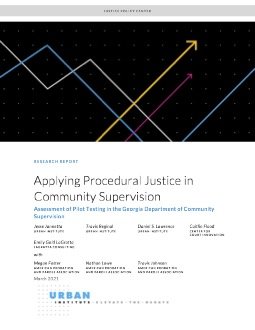By Jesse Jannetta,
, Travis Reginal, Daniel Lawrence, Caitlin Flood, Emily LaGratta
Procedural justice, a framework for authority figures to treat people with fairness and respect, can improve probation supervision and core supervision outcomes. With support from Arnold Ventures, the Urban Institute, the American Probation and Parole Association (APPA), the Center for Court Innovation (CCI), and LaGratta Consulting partnered on an effort to develop and pilot a new procedural justice training curriculum—the Evaluation of Procedural Justice in Probation—outlining new tools and practices for probation officers. Analyses of interactions between supervising officers and people under supervision, survey responses regarding perceptions of supervision, and analyses of administrative data provided mixed findings, with some preliminary indications that participating in the procedural justice training may make probation officers’ treatment of people under supervision fairer and more respectful and improve supervision outcomes. However, the conclusions that can be drawn from even those results supportive of intervention impact are subject to significant limitations, given the nonexperimental nature of the design and the small number of observations in some of the data collected.
Washington, DC: Urban Institute, 2021. 46p.


